Choosing the Right Food for Your Scottish Fold Cat
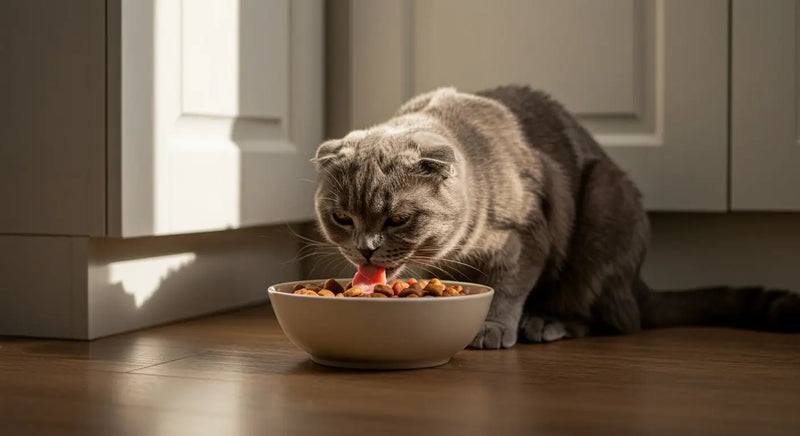
Welcoming a Scottish Fold cat into your home is an exciting experience. These adorable felines are known for their distinctive folded ears and sweet, affectionate nature. One of the most crucial aspects of caring for your Scottish Fold is providing them with a balanced and nutritious diet. Understanding what constitutes the best food for Scottish fold cats is essential, as their unique genetic makeup requires special dietary considerations.
Scottish fold food choices can significantly impact your cat's overall health, particularly when it comes to joint health and maintaining an optimal weight. A well-planned Scottish fold diet is important for their long-term wellbeing and can help support their joint health while maintaining their energy levels.
In this comprehensive guide, we will delve into the dietary needs of your beloved furry friend, offering valuable insights to help you make the best choices for their health and happiness.
Understanding the Unique Diet Needs of Scottish Fold Cats
The genetic characteristics that make Scottish Fold cats so endearing also create specific nutritional requirements that responsible owners must understand when selecting the best food for Scottish Fold cats.
Breed-Specific Considerations
Scottish Fold cats have specific dietary requirements that set them apart from other breeds. Their distinctive folded ears are the result of a genetic mutation that can sometimes lead to joint issues. This means that their diet should focus on maintaining healthy joints and preventing obesity.
The cartilage abnormality that creates their adorable folded ears can also affect other cartilage in their body, making weight management and joint support through proper Scottish Fold food selection particularly crucial for their long-term mobility and comfort.
Additionally, maintaining an ideal body weight reduces stress on their joints and can help prevent the development of arthritis and other mobility issues as they age.
Protein-Rich Diet
Proteins are the building blocks of a cat's body, and they play a crucial role in maintaining muscle mass and overall health. Opt for high-quality, animal-based proteins to ensure your Scottish Fold gets the essential nutrients they need.
Look for foods where real meat, poultry, or fish appears as the first ingredient, as this indicates a protein-rich foundation that supports their carnivorous nature and helps maintain lean muscle mass. Quality protein sources also provide essential amino acids that support tissue repair and immune function, which is particularly important for Scottish Folds who may be prone to certain health challenges.
Essential Nutrients
Apart from proteins, Scottish Folds require a balanced mix of essential nutrients, including vitamins, minerals, and amino acids. These nutrients are vital for maintaining a glossy coat, strong teeth, and a robust immune system. A well-balanced Scottish Fold diet should provide these nutrients in appropriate proportions to support their unique genetic makeup and promote optimal health throughout their lifespan.
Key nutrients that should be prioritized in a Scottish Fold diet include:
-
Omega-3 fatty acids - Support joint health and reduce inflammation
-
Glucosamine and chondroitin - Help maintain cartilage and joint function
-
Vitamin E and C - Provide antioxidant support for overall health
-
Taurine - Essential amino acid for heart and eye health
-
Calcium and phosphorus - Support bone and dental health
-
B-complex vitamins - Aid in energy metabolism and nervous system function
These nutrients work together to address the specific health considerations associated with the Scottish Fold breed while supporting their overall well-being. Regular consultation with your veterinarian can help ensure your cat's diet meets all their individual nutritional needs.
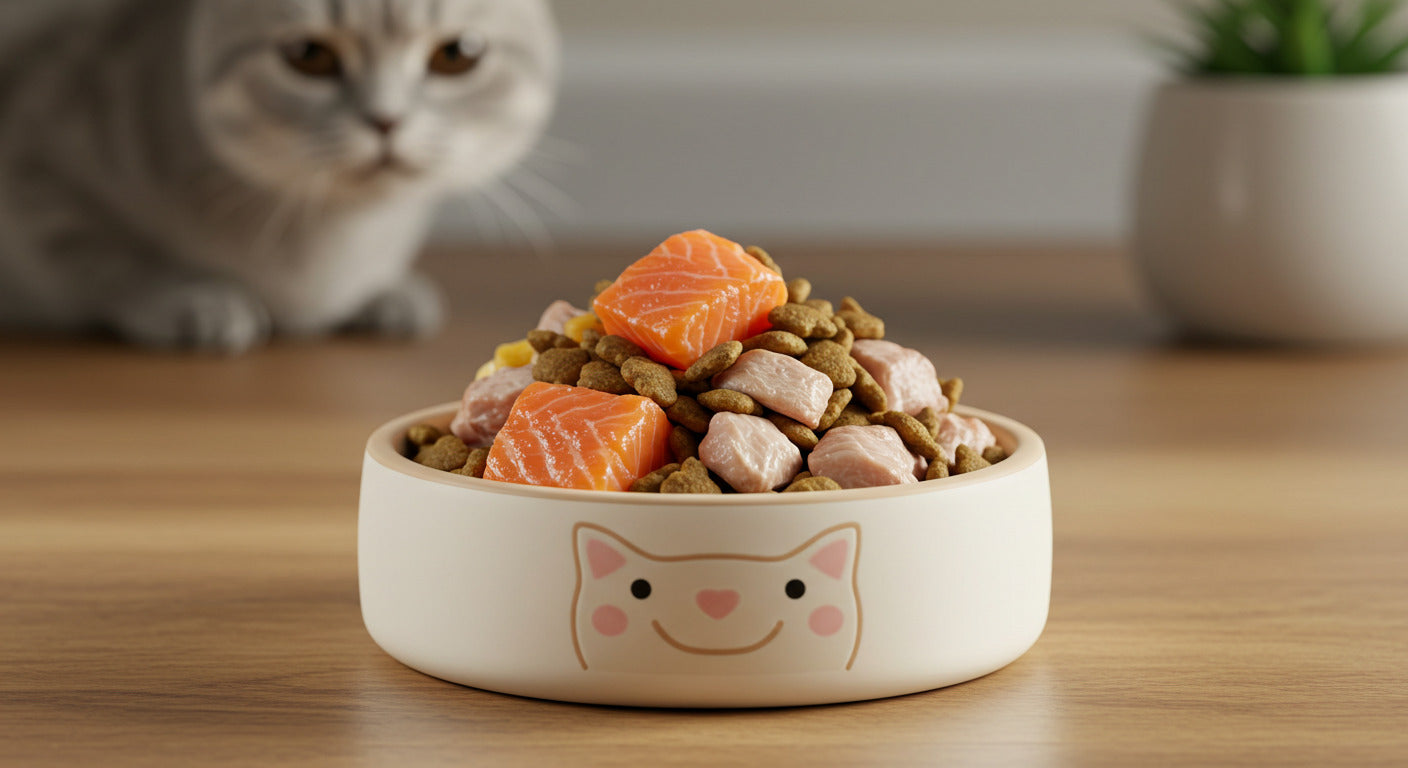
Types of Diets for Scottish Fold Cats
When selecting the best food for Scottish Fold cats, owners have several dietary options to choose from, each with its own benefits and considerations that should align with your cat's specific health needs and lifestyle.
Commercial Cat Food
Commercial cat food provides a convenient and balanced option for busy cat owners. Look for reputable brands that use premium ingredients and have a high protein content. Avoid products with excessive fillers and artificial additives.
When choosing Scottish Fold food, prioritize brands that specifically address joint health concerns, as many premium commercial foods now include glucosamine and omega-3 fatty acids. Always read ingredient labels carefully and select foods that meet AAFCO (Association of American Feed Control Officials) nutritional standards for complete and balanced nutrition.
Homemade Cat Food
Preparing homemade cat food allows you to have complete control over the ingredients. However, it's crucial to consult with a veterinarian or feline nutritionist to ensure you're meeting all of your Scottish Fold's dietary needs. Creating a balanced Scottish Fold diet at home requires careful planning to include all essential nutrients, vitamins, and minerals that commercial foods typically provide through fortification.
Essential components for a balanced homemade Scottish Fold diet include:
-
High-quality protein sources - Chicken, turkey, fish, or lean beef as the primary ingredient
-
Organ meats - Liver, kidney, and heart for essential vitamins and minerals
-
Appropriate supplements - Taurine, vitamins, and minerals as recommended by your vet
-
Healthy fats - Fish oil or chicken fat for omega-3 fatty acids
-
Limited carbohydrates - Small amounts of vegetables or grains if desired
-
Proper calcium-phosphorus ratio - Critical for bone and joint health
Raw Diet
A raw diet, consisting of uncooked meat, bones, and organs, mimics a cat's natural diet in the wild. While this can be a highly nutritious option, it requires careful planning to ensure your cat receives all essential nutrients.
Raw diets can be particularly beneficial for Scottish Folds when properly balanced, as they typically provide high-quality proteins and natural enzymes that support joint health. However, food safety considerations and the need for proper nutritional balance make professional guidance essential when implementing this feeding approach.
Avoiding Harmful Foods in Your Scottish Fold Diet
Understanding which foods to avoid is just as important as selecting the best food for Scottish Fold cats, as certain common household items can pose serious health risks to your feline companion.
Toxic Foods
Certain foods can be harmful or even toxic to your Scottish Fold. These include chocolate, onions, garlic, and alcohol. Always keep these items out of reach. When planning your Scottish Fold diet, it's essential to be aware that cats metabolize certain substances differently than humans, making foods that are safe for us potentially dangerous for them. Even small amounts of these toxic foods can cause serious health complications, ranging from digestive upset to organ damage or even death.
Common toxic foods that should never be included in Scottish Fold food include:
-
Chocolate and caffeine - Can cause heart problems, seizures, and death
-
Onions and garlic - Damage red blood cells and cause anemia
-
Grapes and raisins - Can lead to kidney failure
-
Alcohol - Extremely toxic and can cause coma or death
-
Xylitol (artificial sweetener) - Causes rapid insulin release and liver damage
-
Raw eggs - Risk of salmonella and biotin deficiency
-
Cooked bones - Can splinter and cause choking or internal injuries
Lactose Intolerance
Many cats are lactose intolerant, so it's best to avoid giving them milk or dairy products. Instead, opt for lactose-free alternatives if you want to treat them. This is particularly important for Scottish Folds, as digestive upset can exacerbate any existing health sensitivities.
While kittens can digest their mother's milk, most adult cats lose the ability to produce lactase, the enzyme needed to break down lactose. Feeding dairy products can result in stomach upset, diarrhea, and dehydration, which can be especially problematic for cats with existing health concerns.

Optimizing Your Scottish Fold Food Experience: Management and Care Tips
Understanding how to properly manage your cat's feeding routine goes beyond simply selecting the best food for Scottish Fold cats - it involves creating a comprehensive approach to their daily nutritional care.
Essential feeding management considerations for your Scottish Fold diet include:
-
Individual Food Preferences - Just like humans, cats have their own taste preferences. Pay attention to what your Scottish Fold enjoys and tailor their diet accordingly. Some may prefer wet food, while others may lean towards dry kibble. Understanding your cat's preferences helps ensure they maintain a healthy appetite when introducing new Scottish Fold food options.
-
Managing Portion Sizes - Maintaining a healthy weight is crucial for your Scottish Fold's well-being. Be mindful of portion sizes and monitor your weight regularly to prevent obesity. Given their genetic predisposition to joint issues, keeping Scottish Folds at an optimal weight is essential for reducing stress on their joints and preventing arthritis.
-
Hydration and Water Consumption - Always ensure your Scottish Fold has access to fresh, clean water. Proper hydration is essential for their overall health and can help prevent urinary tract issues. Wet food can also contribute to their daily water intake, which is especially beneficial for cats who don't drink enough water on their own.
-
Feeding Schedule Consistency - Establishing regular meal times helps with digestion and creates a routine that reduces stress. Most adult Scottish Folds do well with two meals per day, spaced 8-12 hours apart. Consistent timing also makes it easier to monitor your cat's appetite and detect any changes in eating habits.
-
Food Transition Methods - When changing your Scottish Fold's diet, gradual transitions over 7-10 days prevent digestive upset. Start by mixing 25% new food with 75% old food, gradually increasing the new food ratio every few days. This approach is particularly important for Scottish Folds, who may have sensitive stomachs.
Conclusion
In conclusion, providing the right diet for your Scottish Fold cat is a vital aspect of responsible pet ownership. Understanding their unique needs, choosing the right type of diet, avoiding harmful foods, and catering to their preferences will contribute to a happy and healthy life for your beloved feline companion.
Selecting the best food for Scottish Fold cats requires careful consideration of their breed-specific health concerns, particularly their joint health and tendency toward weight gain. By focusing on high-quality proteins, essential nutrients, and proper portion control, you can help ensure your Scottish Fold maintains optimal health throughout their life.
Remember that every cat is unique, so working closely with your veterinarian to develop a personalized Scottish Fold diet plan will provide the best outcomes for your furry friend's individual needs and health status.
Frequently Asked Questions
1. Can I feed my Scottish Fold a vegetarian diet?
No, it's not recommended. Cats are obligate carnivores and require animal-based proteins for essential nutrients like taurine and vitamin A that cannot be obtained from plant sources. Scottish Folds particularly need high-quality animal proteins to support their joint health.
2. How can I transition my cat to a new diet?
Gradually mix the new food with the old over a period of 7-10 days to avoid digestive upset. Start with 75% old food and 25% new food for 2-3 days, then move to 50/50, followed by 25% old and 75% new food before completely switching. This is especially important for Scottish Folds, who may have sensitive stomachs.
3. Are there specific foods that promote dental health in cats?
Yes, dental-specific cat foods or treats can help reduce tartar buildup. Consult your vet for recommendations. Dry kibble with special textures designed to scrape teeth and foods formulated with plaque-fighting enzymes can be beneficial for maintaining oral health.
4. Can I give my cat milk?
It's best to avoid giving cats milk, as many are lactose intolerant and it can lead to digestive issues like stomach upset and diarrhea. If you want to give your Scottish Fold a milk-like treat, opt for lactose-free cat milk available at pet stores.
5. What should I do if my Scottish Fold is overweight?
Consult your vet for a tailored diet plan and incorporate regular play and exercise into their routine. Weight management is particularly crucial for Scottish Folds due to their joint issues. Your vet may recommend prescription weight management food and specific portion sizes with regular monitoring.
Tags:


























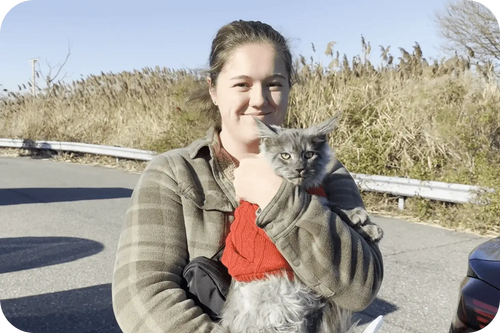
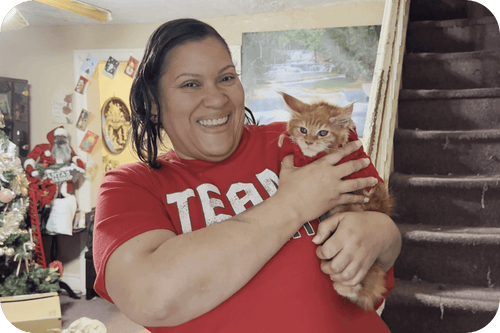
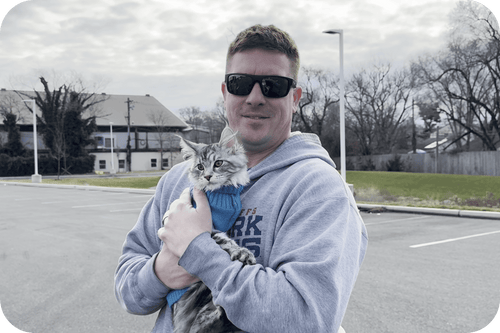











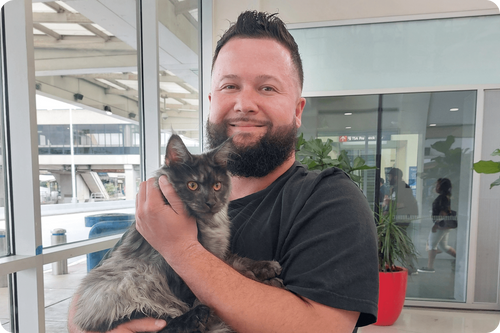














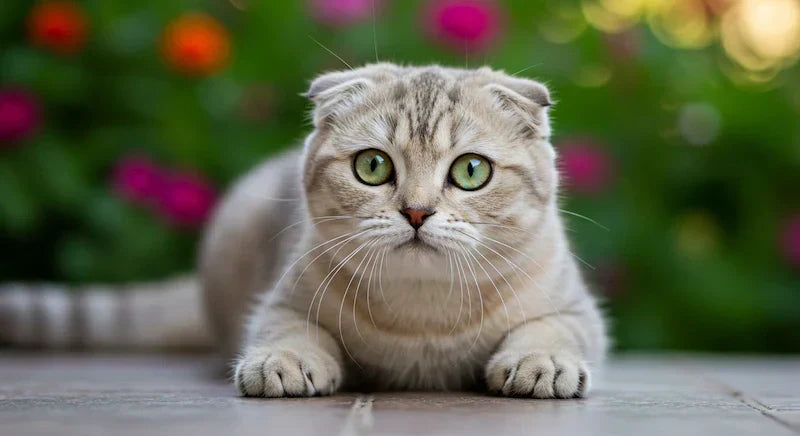





Comments(0)